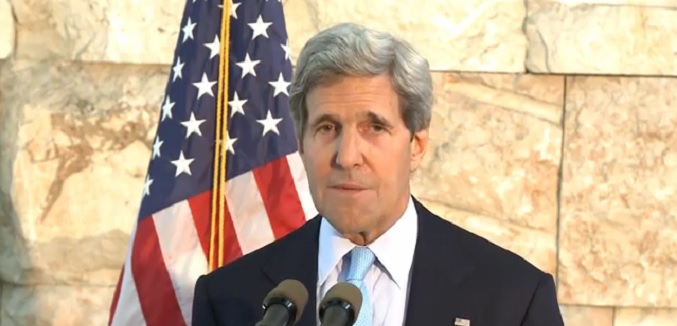Speaking at Israel’s Ben Gurion airport Friday, Secretary of State John Kerry told reporters that the Obama administration is seeking to reassure Jerusalem not just regarding Iran but also regarding “threats to Israel’s security [in]… the final status negotiations process” between Israelis and Palestinians.
But neither peace nor prosperity are possible without security, and the United States will only support a final status agreement that makes both Israelis and Palestinians more secure than they are today. As I made clear yesterday, the commitment of the United States to Israel’s security is ironclad. It is a commitment that spans decades. It is permanent. In 1973, that commitment was the driving force behind the 32-day airlift the United States conducted to deliver military assistance to Israeli forces during the Yom Kippur War. More than 20 years ago, that commitment was the reason we began work with Israel to develop ballistic missile defense technologies that continue to protect the Israeli people from the range of threats that they face every day. And at this moment, our commitment to Israel’s security – a central issue as we work towards a lasting peace between the Israelis and the Palestinians, and as we work towards the creation of a viable, independent, Palestinian state.
Peace talks have stumbled in recent days as Palestinian officials rejected U.S. bridging proposals designed to reconcile Israeli security needs, including those revolving around the geo-strategically important Jordan Valley along the border with Jordan, with Palestinian demands. Hebrew-language media outlets reported that that the U.S. had agreed to a long-term Israeli military presence in the area, presumably putting aside scenarios that would have had an international force stationed in the area. Analysts and journalists have pointedly noted that Kerry may have trouble convincing the Israelis that U.S. security assurances can be relied upon in the aftermath of the recently announced interim deal between the P5+1 global powers and Iran over the latter’s nuclear program. The terms of the Geneva deal have come under increasingly broad criticism for disadvantaging the U.S. and its allies heading into comprehensive negotiations, as revelations slowly emerged that the agreement allows Iran to continue stockpiling enriched uranium in oxide form and continue bolstering its plutonium production facility, even as the financial relief provided by the international community threatens to unravel the sanctions regime targeting Iran. The White House has also clarified, after being pressed on the issue by journalists, that Iran will likely be allowed to continue enriching nuclear material even after a comprehensive agreement is sealed. Obama officials had for years assured lawmakers and allies that a negotiated solution to Iran’s atomic program would require Tehran to fully suspend its nuclear activities, as required by half a dozen United Nations Security Council resolutions. Kerry also told reporters at Ben Gurion that Israeli prime minister Benjamin Netanyahu has been “extremely constructive in working with [the United States] on the next steps and where we need to go now” regarding Iran, even as Washington recognizes that he “has every right in the world to make his views known with respect to his concerns about the security of his country.”
[Photo: U.S.Embassy Tel Aviv / YouTube ]




